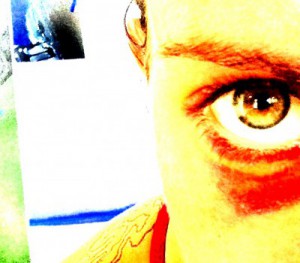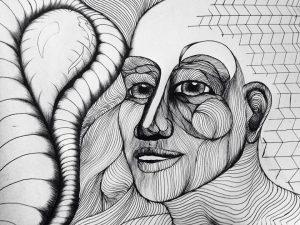
You’re Full of Shit, and So am I
Have you ever found yourself leaning up against the tiles of your shower wall (or perhaps curled up on the bacteria-riddled floor) wondering,
“who the fuck am I?”
If you have, then perhaps you’ll find this interesting; if you haven’t, then you probably need to smoke more weed (and then you might find this interesting)…
In secular culture, the general sentiment is that religion is just a coping mechanism to deal with the ever present horror that we exist and then we die – and that is certainly true – but I realised the other day that the coping mechanism is far more deeply entrenched into our experience of reality than we realise.
The very process of creating “who we are” is the exact same thing; it’s just a collection of beliefs that we’ve attached to.
I heard someone recently quote Karl Marx on a podcast (Marx wasn’t on the podcast, don’t be ridiculous) thusly; “Religion is the opiate of the masses”. He was absolutely right, but why to the masses need an opiate? What do religion and opiates have in common (besides enthusiasts that prove their commitment through questionable sex acts and extreme violence) that make them so desirable?
 They both provide an answer to this unbearable hopelessness that is intrinsic to the human condition – we are conscious of our temporary existence and don’t understand what we’re supposed to do about it. That answer is “belief” – religion gives you a giant pile of them, and opiates wipe away the need to have any at all.
They both provide an answer to this unbearable hopelessness that is intrinsic to the human condition – we are conscious of our temporary existence and don’t understand what we’re supposed to do about it. That answer is “belief” – religion gives you a giant pile of them, and opiates wipe away the need to have any at all.
So we could say that this existential horror is like rain coming through a crack in your roof; you plaster over it with a belief, and it works just fine for quite some time. Then, as you gain more knowledge, the water finds new ways to leak through around the belief, slowly disintegrating your patchwork until it finally breaks through. So you clean it all up, update the out-dated belief, and re-plaster it with some new justifications to keep it solid.
Or, you could just free-base oxycodone and lay under the disintegrating roof as the rain beats down on your numb and seemingly lifeless body (because fuckit, it’s coming in either way, and this way you can’t feel it at all).
You might be sitting there, feeling a bit righteous and smug because you’re not a religious zealot or a junky (and if you are either of those things, not to worry, you’re about to be vindicated), but I’ve got bad news for you – you’re no better, and here’s why:
Everything you’ve ever thought about who you are, what’s right, and what’s wrong, is exactly the same coping-mechanism employed by the zealot and the junky; your inputs are just a bit more diverse. Who you ‘think you are’ is merely a collection of beliefs and opinions about those beliefs. Rather than having one source (your religion or a pharmacological escape from consciousness) you have slowly compiled these beliefs over your lifetime to make sense of your experiences and your place within them.
Think about Facebook – your profile is just a glaring extension of that very same process– in the same way that we present a “profile” to others on Facebook, our actual “self” is just a collection of interpretations of reality to which we’ve chosen to attach and share.
It gets worse too – these interpretations come from other interpretations from other “selves” that came from other “selves” and so on…. Marx had an idea, and Damien shared it in a podcast; I interpreted it, I attached to it, I re-developed it and generated another idea, I shared it, you read it, you attach to it (or reject it), and so it goes on into infinity.
So if that’s the case, what makes you, “you”? If I’m just walking around regurgitating other people’s ideas and beliefs, what makes me any different to them?
I think the closest thing to the “real” you is the thing that experiences the option to attach to certain ideas and not others. I am the thing choosing the unique combination of stolen ideas and opinions that I’ve collected.
***
When we realise that we’re just an oozing, moving, sticky pile of beliefs and interpretations, it becomes really hard to tell how we actually “feel” in a given circumstance – if the experience feels “wrong”, does it feel wrong because it’s intrinsically “wrong” or is it just conflicting with a pre-existing belief about what is “right”? Here’s an example:
ONE : I meet someone at a party and have the opportunity to have sex with them, but I don’t feel like it. Why not? I suppose I’m biologically concerned about them sticking around to look after an offspring, I don’t want to be a “slut”, I want to feel connected and comforted and that doesn’t seem likely, I don’t know if they might hurt me when I’m vulnerable and naked or if they’ll give me chlamydia. Or if I’ll give them chlamydia and have to tell them about it later on Facebook. I try to resolve a few of those uncertainties, and then weigh up whether the vulnerability is worth it for the amount of shame and loneliness I’ll feel afterwards, and I decide not to do it. I leave the party feeling content, confident, and happy.
TWO : I meet someone at a party and have the opportunity to have sex with them, and I do it. Why? I like what it feels like to have sex, I know that I took the right precautions to protect myself from disease or pregnancy and I know that I could knock them out if things got physically unpleasant. I don’t need them to love me to appreciate a physical connection, and I leave the experience feeling content, confident, and happy.
The experience in both the above examples is identical – the opportunity to have sex with a stranger. My experience of them, however, is drastically different. This entire process of decision making is informed by my beliefs about right and wrong, as dictated to me by my culture, my past experiences, and who I believe I am. So how I feel about each decision is relative only to its context within my own head.
I create the story, the feeling, and catalogue the experience accordingly.
My experience of the stranger is informed purely by my interpretations, which are tainted by how I feel about my own actions. None of this has ANYTHING to do with him – no matter what he says or does, I’ll filter it to fit into the story that’s already inside my head.
No wonder were so fucking lonely.
It does seem necessary to have these beliefs in order for us to navigate the world in a meaningful way and create a distinction between us and our external reality, however, the trouble is that we often confuse these beliefs with reality, and tend to exclude information that contradicts them…
Going back to the same example, let’s say that when I left the party, I left with a phone number (or, more likely, and to my perpetual chagrin, a “new Facebook friend”).
In order to know how I’m supposed to feel about it all, I need to tell myself a story about the experience by creating a narrative that makes sense to my pre-existing beliefs. For example; if he looked at his phone a lot, then, “I was boring and he’s an asshole.” If we laughed a lot and he asked interesting questions, then “he’s probably too good for me and thinks I’m a moron but he’s perfect.”
So when we introduce a feedback loop (this line of communication), whatever I’ve told myself will be challenged by the inputs coming back to me from the real world. Any communication (or lack there-of) will be matched against that belief, and anything that contradicts it will be met with harsh criticism, or, worse, completely ignored.
If I convinced myself that he’s an asshole, I’ll read every text or (lack thereof) as him being selfish and useless. If I’ve convinced myself that he’s perfect, I’ll read every text (or lack thereof) as proof that I’m not good enough. This poor guy’s got no chance – and, what’s even stupider, is he’s doing the same thing right back to me within his own set of beliefs and I have no idea what they might be.
Perhaps he doesn’t think I’m a moron, and is worried that I think he’s a moron, so he keeps coming up with smarter questions to keep me interested and I keep thinking I’m an idiot so I shut down even worse.
What’s the end result here? Two people who have no idea how to genuinely connect to each other through our own imaginations of each other. Its like looking out the car window to enjoy the scenery, and all you can see is the reflection of your own silly head.
And how do we fix it? You can’t but awareness of it seems to help.
Shift your focus to the landscape rolling past, rather than the reflection in the window. Be wary of advice to “just be yourself” because you don’t know who you are and no one else gives a shit because they’re too busy pretending to be somebody too…
With love as always, thank you for reading, and stay tuned for another chapter someday soon.


Ah so nice to see you writing again friend! As always, I appreciate your insight and humor and perhaps we can have an intimate facebook chat about all of this soon. I have some thoughts about what you wrote and that being so, combined with this handy comment box, I feel inclined to leave them here.
I think that the statement “Religion is the opiate of the masses” has become true, but at it’s essence, when religion is fulfilling it’s true function, it’s actually quite the opposite.
To me, religion at it’s best is a metaphorical system for triggering our own latent potentials for grasping the divine, a reality outside our own little worlds that as you rightly said, are quite clearly horseshit. That this reality exists needs no proof, because the one and only fact that we can actually no for certain is that we exist. Reality, whatever that word means, exists.
The core of every religion is aimed at the experiential recognition of this reality, which, not coincidentally, is synonymous with the suspension of the false thought vortex that the reality of our being is so invested in. Religion at it’s best is a mystical practice of self-immolation and is at it’s very core the least comforting and anesthitizing endeavor known to human-kind.
And so I would contest your point that we don’t fix it. I think the great potential of humanity is in the possibility of engaging in practices that dismantle the falsity that we have come to identify with. True relating only happens in love, and true love is only possible when we are existing outside of the identification with the mental structure. But true relating is possible.
Ram Dass said that “No one gets enlightened.” And the implication is just that. The relative mind doesn’t get anything. But the beingness that we actually are has the potential to recognize the case of mistaken identity and live from another place.
It’s sad to me that our own hubris, built on 250 years of Cartesian thought, has us all denying wisdom traditions that have existed for tens of thousands of years. Modern day church surely is a mechanism of control and social cohesion, perhaps also an infantile expression of magical thinking, but that does not mean the wisdom and truth of a higher order of wholeness which has been spoken of and transmitted for millenia is a fabrication of delusion. I would argue that it’s the opposite.
But to undo the lie is a lot of fucking work. And it hurts. It always seems to come past the edges of comfort, like staying in the pocket with the person at the party, playing the game until somehow, a crack of light slips through the mask, and someone takes the chance of actually expressing from a place of truth.
Ah that’s probably enough rambling from me. Much love and keep writing 🙂